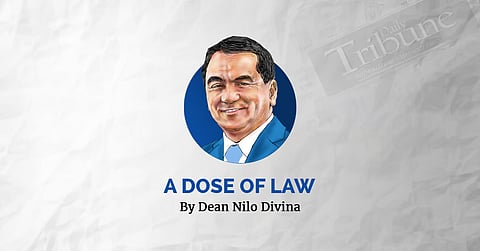
- HEADLINES
- NEWS
- PAGE THREE
- COMMENTARY
- BUSINESS
- LIFE
- ACTION
- GLOBAL GOALS
- SNAPS
- DYARYO TIRADA
- MORE

In Part 1 of this article, I mentioned that the agreement the parties may execute need not strictly be a Technology Transfer Agreement (TTA) by saying “or other similar agreement.” This is because while the transaction between commercial entities may essentially involve the licensing of intellectual property rights, it does not automatically make the agreement between them strictly a TTA.
The Intellectual Property Office (IPO) stressed that an agreement involving the transfer, assignment or licensing of intellectual property rights will be considered a TTA only if it involves the transfer of systematic knowledge. Whether an agreement involves a systematic transfer of knowledge would have to be determined on a case-to-case basis. If an agreement qualifies as a TTA, then there are certain types of stipulations that are prohibited from being incorporated therein because they are deemed to have prima facie adverse effects on competition.
But whether a TTA or similar agreement, issues regarding ownership, extent of such ownership, allowable uses of the licensed mark/s, exclusivity, duration, expenses and sharing thereof, grounds for termination, dispute resolution, and so on and so forth could be clarified and detailed. In short, the agreement allows the parties the advantage of anticipating as much as possible potential areas of future disagreements and addressing other contingencies.
Needless to state, this particular route would entail negotiations between the parties that would require not just a rigorous and careful drafting, review and documentation of the agreement (and the revisions thereof) but competent advice from the parties’ respective counsels to ensure that each gets what he bargained for.
While this detailed contractual route may take time and cost money in the short term, in the long term it actually saves the parties the much higher costs of litigation by preventing, to the extent of their investment in negotiating and executing the agreement, uncertainties that can lead to bitter disputes.
In this way, a party does not have to exclaim “I have voluminous receipts” to the other party in the future but proceed instead to business as usual.
The Cymar case also provides another lesson within this lesson. Since litigation can become more complex and protracted not just by the number of pending cases (in Cymar, there were four) but because of the appeals process each case could go through, procedural rules might be seen by the other party as another legal barrier — on top of the actual cases themselves — to a full and undisturbed enjoyment of one’s property rights.
True enough, Cymar argued throughout the appeals process that Farling’s evidence in the cancellation case should not have been admitted and appreciated in the subsequent opposition cases because they were uncertified photocopies. The reason for Farling’s non-submission of the originals in the opposition cases, however, is because it had already submitted the same in the cancellation case.
Farling’s explanation would have been sufficient given that administrative agencies like the IPO are not bound by the technical rules of procedure that are usually applicable in courts of law except for the fact that the Rules in Inter Partes Proceedings themselves required Farling in that case to secure a certification from the Bureau of Legal Affairs (BLA)-IPO regarding the copies of the cancellation documents that it intends to present as well in the subsequent opposition cases.
Fortunately for Farling once more, the BLA-IPO itself heavily relied on the evidence and the ruling in the cancellation case to support its rulings in all the subsequent opposition cases. The Court construed such reliance as the BLA-IPO’s approval of the incorporation of such evidence in the subsequent opposition cases even when the documents Farling submitted in the latter were uncertified photocopies of its evidence in the cancellation case.
While Farling again prevailed on this procedural aspect, it again demonstrates the added costs of not having a clear and more detailed agreement/s in the first place.
For more of Dean Nilo Divina’s legal tidbits, please visit www.divinalaw.com. For comments and questions, please send an email to cad@divinalaw.com
